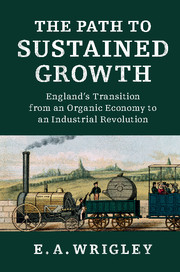Refine search
Actions for selected content:
26946 results in Economic history
Bibliography
-
- Book:
- Conflict and Commerce in Maritime East Asia
- Published online:
- 18 December 2015
- Print publication:
- 05 January 2016, pp 306-325
-
- Chapter
- Export citation
Appendix 4 - Glossary of Chinese characters
-
- Book:
- Conflict and Commerce in Maritime East Asia
- Published online:
- 18 December 2015
- Print publication:
- 05 January 2016, pp 295-305
-
- Chapter
- Export citation
Acknowledgments
-
- Book:
- Conflict and Commerce in Maritime East Asia
- Published online:
- 18 December 2015
- Print publication:
- 05 January 2016, pp ix-xii
-
- Chapter
- Export citation
Figures and maps
-
- Book:
- Conflict and Commerce in Maritime East Asia
- Published online:
- 18 December 2015
- Print publication:
- 05 January 2016, pp vi-vi
-
- Chapter
- Export citation
Appendix 2 - Measurements and currency conversions
-
- Book:
- Conflict and Commerce in Maritime East Asia
- Published online:
- 18 December 2015
- Print publication:
- 05 January 2016, pp 262-262
-
- Chapter
- Export citation
1 - Setting the stage
-
- Book:
- Conflict and Commerce in Maritime East Asia
- Published online:
- 18 December 2015
- Print publication:
- 05 January 2016, pp 22-39
-
- Chapter
- Export citation
Acknowledgements
-
- Book:
- Export Empire
- Published online:
- 05 December 2015
- Print publication:
- 05 January 2016, pp xi-xiii
-
- Chapter
- Export citation
Part II - Nazi imperialism
-
- Book:
- Export Empire
- Published online:
- 05 December 2015
- Print publication:
- 05 January 2016, pp 179-329
-
- Chapter
- Export citation
5 - The Zheng state on Taiwan
-
- Book:
- Conflict and Commerce in Maritime East Asia
- Published online:
- 18 December 2015
- Print publication:
- 05 January 2016, pp 146-175
-
- Chapter
- Export citation
2 - The economics of trade: building commercial networks in Southeastern Europe, 1925–1930
- from Part I - German power in the Wilhelmine Empire and the Weimar Republic
-
- Book:
- Export Empire
- Published online:
- 05 December 2015
- Print publication:
- 05 January 2016, pp 68-106
-
- Chapter
- Export citation
Dedication
-
- Book:
- Export Empire
- Published online:
- 05 December 2015
- Print publication:
- 05 January 2016, pp v-vi
-
- Chapter
- Export citation
6 - The lure of “China”
-
- Book:
- Conflict and Commerce in Maritime East Asia
- Published online:
- 18 December 2015
- Print publication:
- 05 January 2016, pp 176-209
-
- Chapter
- Export citation
8 - Conclusion
-
- Book:
- Conflict and Commerce in Maritime East Asia
- Published online:
- 18 December 2015
- Print publication:
- 05 January 2016, pp 241-260
-
- Chapter
- Export citation
Index
-
- Book:
- Conflict and Commerce in Maritime East Asia
- Published online:
- 18 December 2015
- Print publication:
- 05 January 2016, pp 326-332
-
- Chapter
- Export citation
4 - Brave new world
-
- Book:
- Conflict and Commerce in Maritime East Asia
- Published online:
- 18 December 2015
- Print publication:
- 05 January 2016, pp 111-145
-
- Chapter
- Export citation

The Path to Sustained Growth
- England's Transition from an Organic Economy to an Industrial Revolution
-
- Published online:
- 05 January 2016
- Print publication:
- 21 January 2016
Appendix 3 - Zheng market share, revenues, and profitability, 1640–1683
-
- Book:
- Conflict and Commerce in Maritime East Asia
- Published online:
- 18 December 2015
- Print publication:
- 05 January 2016, pp 263-294
-
- Chapter
- Export citation
7 - Forging a hinterland: German development aid in the Balkans, 1934–1940
- from Part II - Nazi imperialism
-
- Book:
- Export Empire
- Published online:
- 05 December 2015
- Print publication:
- 05 January 2016, pp 253-291
-
- Chapter
- Export citation
2 - From smuggler-pirates to loyal Confucians
-
- Book:
- Conflict and Commerce in Maritime East Asia
- Published online:
- 18 December 2015
- Print publication:
- 05 January 2016, pp 40-72
-
- Chapter
- Export citation
8 - The Second World War: informal empire transformed, 1939–1945
- from Part II - Nazi imperialism
-
- Book:
- Export Empire
- Published online:
- 05 December 2015
- Print publication:
- 05 January 2016, pp 292-329
-
- Chapter
- Export citation
